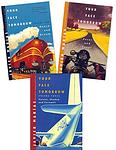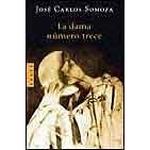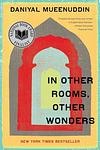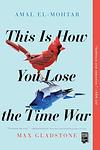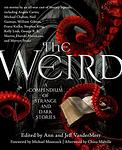The Greatest Multiple, Spanish "Fiction" Books Since 1980
Click to learn how this list is calculated.
This list represents a comprehensive and trusted collection of the greatest books. Developed through a specialized algorithm, it brings together 300 'best of' book lists to form a definitive guide to the world's most acclaimed books. For those interested in how these books are chosen, additional details can be found on the rankings page.
Genres
Countries
Date Range
Reading Statistics
Click the button below to see how many of these books you've read!
Download
If you're interested in downloading this list as a CSV file for use in a spreadsheet application, you can easily do so by clicking the button below. Please note that to ensure a manageable file size and faster download, the CSV will include details for only the first 500 books.
Download-
1. The Shadow of the Wind by Carlos Ruiz Zafon
The novel follows the story of a young boy in post-war Barcelona, who discovers a mysterious book in a hidden library that his father takes him to, which houses forgotten books. The boy becomes captivated by the book and its author, but as he grows older, he realizes that someone is destroying all books written by this author. As he delves deeper into the mystery, the boy's life becomes intertwined with the author's, revealing a dark and tragic past that someone wants to be kept hidden. The story is a mix of romance, mystery, and a historical narrative set against the turbulent backdrop of a city recovering from war.
-
2. A Heart So White by Javier Marías
The novel delves into the complexities of relationships, secrets, and communication as the protagonist, a translator and interpreter, grapples with the mysterious suicide of his father's first wife and the pervasive silence surrounding it. Through his own marriage and his observations of others', he contemplates the unsaid and the power of words, both spoken and unspoken. The narrative weaves through time and memory, exploring the impact of the past on the present and the intricate ways in which people understand and misunderstand each other.
-
3. The Club Dumas by Arturo Pérez-Reverte
The book follows Lucas Corso, a book detective who is hired to authenticate a rare manuscript by Alexandre Dumas. As he delves into the investigation, he finds himself entangled in a mystery involving two other books: a rare edition of "The Three Musketeers" and a satanic text, "The Book of Nine Doors of the Kingdom of Shadows". The narrative becomes a complex puzzle as Corso uncovers connections between the books, while also dealing with a seductive woman who seems to have stepped out of a Dumas novel, a mysterious killer, and a group of bibliophiles obsessed with Dumas. The lines between fiction and reality blur as he gets closer to the truth.
-
4. Bartleby & Co by Enrique Vila-Matas
"Bartleby & Co" is a metafictional work that explores the theme of "writers of the No," authors who cease to write or never start at all. The narrator, an office worker on sick leave, uses footnotes to a nonexistent text to delve into the stories of these authors, including famous real-life figures. The book serves as a meditation on silence, refusal, and the nature of literature itself.
-
5. Your Face Tomorrow: Fever and Spear by Javier Marías
The novel explores the life of a Spanish expatriate in England who is recruited by a secretive organization due to his unique ability to interpret people's behavior. As he becomes entangled in a world of espionage, he grapples with moral and ethical dilemmas, questioning the validity of his work and the consequences of his actions. Through a blend of introspective musings and suspenseful narrative, the protagonist's life unravels, revealing a complex web of deceit, betrayal, and violence.
-
6. Larva: Midsummer Night's Babel by Julián Ríos
"Larva: Midsummer Night's Babel" is a complex and innovative novel that explores the nature of language and the power of words. It's a narrative labyrinth that follows a group of characters through the streets of London on a midsummer night, as they engage in a series of intellectual debates and discussions. The story is filled with puns, word games, and literary references, and is written in a unique style that blends poetry and prose. The novel is also a satire of the literary world, with the characters often critiquing and parodying various literary styles and authors.
-
7. Obabakoak by Bernardo Atxaga
Obabakoak is a collection of interconnected stories that revolve around the inhabitants of a fictional Basque village named Obaba. The stories, which are a blend of the magical and the everyday, explore the complexities of human nature, as well as the rich history and culture of the Basque region. Themes of love, fear, tradition, and change are woven throughout, offering a nuanced and evocative portrait of a community and its people.
-
8. All Souls by Javier Marías
"All Souls" is a novel that follows the experiences of a Spanish professor teaching at Oxford University. His life is filled with eccentric colleagues, a puzzling love affair, and a mysterious sense of intrigue. As the protagonist navigates through the academic world, he becomes entangled in a web of personal relationships and bureaucratic intricacies. The book is a blend of romance, suspense, and satire, with a poignant exploration of memory, longing, and the ephemeral nature of human relationships.
-
9. A Light Comedy by Eduardo Mendoza
"A Light Comedy" is a humorous tale set in Barcelona during the 1940s, centered around a middle-aged woman who, after losing everything in the Civil War, uses her wits and cunning to survive. She turns her apartment into a boarding house for single ladies, but when the business starts to falter, she decides to concoct a plan to marry a rich American. The novel is filled with a colorful cast of characters, and is a satirical commentary on the social and political climate of the time.
-
10. The Heretic by Miguel Delibes
"The Heretic" is a historical novel set during the Spanish Inquisition. It follows the life of a man born in 16th century Spain, who, despite being raised in a strictly Catholic environment, begins to question the teachings and practices of the Church. As he grows older, he becomes involved in the Protestant Reformation, risking his life in a society where heresy is punishable by death. This book explores themes of faith, religious persecution, and the struggle for freedom of thought.
-
11. Soldiers of Salamis by Javier Cercas
This novel revolves around a true event during the Spanish Civil War, where a nationalist soldier spares the life of a famous poet who was about to be executed. The story is told from the perspective of a journalist who becomes obsessed with the incident and embarks on a quest to uncover the truth about what happened. As he delves deeper, he discovers the complexities of heroism, history, and memory, and is forced to question his own understanding of these concepts.
-
12. La Dama Número Trece by José Carlos Somoza
This novel is a thrilling blend of mystery, horror, and fantasy, revolving around a struggling writer who becomes the target of a secret society known as "The Thirteen Ladies". These shadowy figures have the ability to manipulate reality through the power of words and storytelling. As he is drawn deeper into their world, he must uncover their secrets and find a way to survive their deadly games. The narrative is a rich exploration of the power of language and mythology, with a suspenseful plot that keeps readers on the edge of their seats.
-
13. Yo Yo Boing! by Giannina Braschi
This book is a groundbreaking literary piece that blends various genres, including poetry, fiction, and drama, to explore the complexities of life as a Latino/a in the United States. It presents a series of conversations, debates, and reflections that delve into the cultural and linguistic tensions experienced by the characters. The narrative is characterized by its energetic and playful use of Spanglish, the hybrid language of English and Spanish, and it addresses themes of identity, politics, and the creative process. The work is notable for its experimental structure and its vibrant portrayal of the immigrant experience, capturing the dynamic and often chaotic essence of New York City life.
-
14. La Charte Du Mandé Et Autres Traditions Du Mali by Aboubakar Fofana, Jean-Louis Sagot
"La Charte Du Mandé Et Autres Traditions Du Mali" is a comprehensive exploration of the rich historical and cultural heritage of Mali, focusing on the ancient Mandé Charter, also known as the Manden Charter. This seminal text delves into the origins and implications of this 13th-century document, which is one of the earliest forms of human rights charters. The book not only examines the charter's principles of social justice, equality, and political ethics but also contextualizes it within a broader spectrum of Malian traditions, shedding light on the country's profound historical narratives and the enduring cultural practices that continue to shape its identity.
-
15. Mazurka For Two Dead Men by Camilo José Cela
Set in the rugged landscape of Galicia in the early 20th century, the novel weaves a tale of vengeance and passion through the lives of the inhabitants of a small village. The narrative centers around the murder of a nationalist and the subsequent revenge killing of a local musician, exploring the impact of these deaths on their families and the community. Rich in folklore and the harsh realities of rural life, the story delves into themes of tradition, violence, and the haunting presence of history, all while capturing the deep-seated emotions and complexities of its characters.
-
16. In Other Rooms, Other Wonders by Daniyal Mueenuddin
"In Other Rooms, Other Wonders" is a collection of interconnected short stories that delve into the lives of various characters connected to a wealthy landowner in Punjab, Pakistan. The narrative spans different levels of society, from the landowner himself to his managers, servants, and peasants, weaving a tapestry of tales that reveal the complexities of power, influence, and relationships in Pakistani society. Each story explores themes of love, betrayal, and social mobility, offering a poignant look at the struggles and aspirations of individuals trying to navigate a world governed by tradition and changing socio-economic landscapes.
-
17. The Infatuations by Javier Marías
A young woman becomes obsessed with a seemingly perfect couple she often sees at a café. When the husband is brutally murdered, she gets entangled with the widow and a mysterious man who knew the couple, leading her to question everything she thought she knew about love, death, and fate. As she delves deeper into the circumstances surrounding the husband's death, she is forced to confront unsettling truths about the nature of human relationships.
-
18. Dark Back Of Time by Javier Marías
"Dark Back of Time" is a reflective and metafictional narrative that blurs the lines between reality and fiction, weaving together personal anecdotes, literary criticism, and philosophical musings. The book explores the author's experiences following the publication of a previous novel, which unexpectedly affects the lives of individuals who see themselves reflected in its characters. As the author delves into the consequences of his writing, he examines the elusive nature of memory, the complex interplay between art and life, and the inevitable distortions that arise when reality is transmuted into literature. The work is a profound meditation on the power of storytelling and the enigmatic passage of time that alters perception and understanding.
-
19. Sepharad by Antonio Muñoz Molina
"Sepharad" is a compelling tapestry of narratives that weaves together stories of displacement, loss, and memory across different times and geographies. The novel explores the experiences of various characters, some historical and others fictional, who face the consequences of exile and persecution. Through their interconnected tales, the book delves into the themes of identity, the enduring impact of the Spanish Inquisition, the Holocaust, and the broader human condition of searching for belonging. The title references the Hebrew word for Spain, invoking the Sephardic Jewish diaspora and the broader sense of longing for a homeland that resonates throughout the novel.
-
20. Japanese Philosophy by John C. Maraldo, Thomas P. Kasulis, James W. Heisig
This book provides a comprehensive overview of Japanese philosophy, exploring its unique characteristics and its evolution through history. It delves into the diverse intellectual traditions of Japan, including both well-known philosophical schools and lesser-known but equally significant ideas. The text examines how Japanese philosophy has been influenced by and has interacted with other philosophical traditions, particularly Western philosophy, while also highlighting its distinct approach to fundamental philosophical issues such as ethics, aesthetics, and the nature of reality. Through a detailed analysis, the book offers insights into how Japanese philosophical thought has contributed to broader philosophical discourse and how it reflects the cultural and historical context of Japan.
-
21. The Philosophical Works Of Al Kindi by Peter E. Pormann, Peter Adamson
This book is a comprehensive compilation and analysis of the works of Al-Kindi, often regarded as the first of the Muslim peripatetic philosophers. The text delves into Al-Kindi's extensive contributions to various fields of knowledge, including philosophy, mathematics, astronomy, and medicine, highlighting his role as a pivotal figure in the translation and transmission of ancient Greek philosophy to the Islamic world. Through translations of his works and insightful commentary, the book provides a critical exploration of Al-Kindi's synthesis of philosophical thought and his influence on subsequent Islamic and Western intellectual traditions.
-
22. This Is How You Lose The Time War by Amal El Mohtar, Max Gladstone
In this epistolary science fiction novel, two rival agents, Red and Blue, find themselves on opposite sides of a sprawling temporal conflict known as the Time War. As they carry out missions to manipulate the strands of history for their respective factions, their paths cross in unexpected ways. Through a series of secret letters left across time and space, what begins as taunting correspondence evolves into a deep, forbidden connection. The narrative weaves a complex tapestry of time-travel and intrigue, exploring themes of love, identity, and the consequences of actions within the ever-shifting sands of time. As their bond deepens, Red and Blue must ultimately decide where their loyalties lie and what sacrifices they are willing to make for a chance at a future together.
-
23. The Weird by Ann VanderMeer
"The Weird" is a comprehensive anthology that delves into the strange and uncanny realms of speculative fiction, featuring a diverse collection of stories spanning over a century. This tome curates a wide array of tales from various authors around the world, each contributing their unique voice to the genre of weird fiction. The stories within its pages explore the eerie, the surreal, and the bizarre, often blurring the lines between reality and the fantastical. The anthology serves as both a celebration of the genre's rich history and an introduction to its most compelling voices, offering readers a labyrinthine journey through the many facets of weird literature.
-
24. The Invisible Guardian by Dolores Redondo
This gripping novel unfolds in the misty and myth-shrouded Baztan Valley of Navarre, Spain, where a detective returns to her hometown to investigate a series of eerie murders. The victims, teenage girls, are found in a state that suggests ritualistic killings, drawing the detective into a complex web that ties the present crimes to her own troubled past. As she delves deeper, local superstitions and family secrets emerge, challenging her rational beliefs and forcing her to confront the possibility that the answers she seeks might be as intangible as the mythical Basajaun, the invisible guardian of the forest. The story masterfully blends elements of crime, folklore, and psychological thriller, creating a suspenseful narrative that keeps the reader guessing until the very end.
-
25. The Three Golden Keys by Petr Sis
"The Three Golden Keys" is a beautifully illustrated children's book that blends a magical adventure with a deep sense of nostalgia. Set in the author's hometown of Prague, the story follows a man who returns to the city of his childhood only to find it deserted and his old house locked by three padlocks. Guided by a mysterious cat, he embarks on a quest through the city's storied streets, encountering various mythical and historical figures as he searches for the three golden keys that will unlock his past and restore the vibrant life of Prague. This enchanting tale is both a personal journey and a celebration of Czech folklore and history.
Reading Statistics
Click the button below to see how many of these books you've read!
Download
If you're interested in downloading this list as a CSV file for use in a spreadsheet application, you can easily do so by clicking the button below. Please note that to ensure a manageable file size and faster download, the CSV will include details for only the first 500 books.
Download



